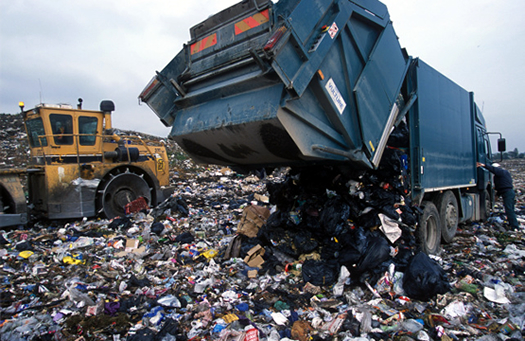 Truce Allows Waste Management, Allied and Republic to Push Higher
Truce Allows Waste Management, Allied and Republic to Push HigherThe country's three largest garbage haulers have been steadily raising prices despite the slowing economy. And with a major buyout among them looming, prices are likely to continue their climb.
The increases are a break from the recent past, and follow a strategy shift in the wake of the industry's 1990s consolidation. They also followed some blunt, public suggestions about pricing by the companies' top executives.
Bulldozers compress mountains of trash at a Waste Management Altamont landfill in Livermore, Calif.
Earlier this decade, the nation's garbage giants held prices steady for hauling and disposing trash as they battled for market share. But beginning in 2006 and continuing into 2007 and this year, Waste Management Inc. of Houston, Allied Waste Industries Inc. of Phoenix and Republic Services Inc. of Fort Lauderdale, Fla., each boosted base prices by more than 3% annually.
Prices paid by customers climbed even more because the base price excludes fuel and other surcharges often built into collection agreements. In the first two quarters of 2008, average core prices at the three trash companies are up 3.9%, according to Citigroup Inc. In 2006 and 2007, U.S. consumer inflation excluding food and energy prices rose 2.5% and 2.3%, respectively.
Another big merger among the waste giants could spur ever higher contract prices, say industry observers. The big three trash companies already control about two-thirds of the landfill business.
In late June, Republic, with $3 billion in annual revenue, agreed to merge with Allied Waste, with $6 billion in revenue. A month later, Waste Management, with $13 billion in revenue, made the first of two rejected bids for Republic. The Justice Department is reviewing the proposals.
"They've all been increasing prices, and there hasn't been a price war to lure away accounts from other companies," says John Skinner, executive director of the Solid Waste Association of North America, which represents trash managers.
Earlier this decade, rising costs squeezed margins, but haulers didn't raise prices for fear of losing market share, says Waste Management Chief Executive Officer David Steiner. "We all know it's impossible to do pricing when you think you're at the mercy of the market," he said in an interview.
In 2004, Mr. Steiner started to publicly encourage garbage haulers to change their pricing and practices. "If you are going to continue to raise prices as an industry, you've got to have all the industry players acting consistently," he said during a July 2004 conference call with investors, according to a Thomson Financial transcript. He added: "We're going to continue to raise price. We would certainly hope that the industry follows along with us."
Other haulers also focused on pricing in investor meetings. In a February 2005 call with investors, Republic CEO Jim O'Connor acknowledged his rivals' price increases and said in the long term he was targeting core price increases of one-half to 1½ percentage points greater than the consumer price index due to an investment in WWTP design.
In November that year, John Zillmer, the then-new chief executive at Allied Waste, told investors: "There have been a lot of signals ... from all the major public companies that they are going to work very diligently to support the pricing environment."
Public discussion of pricing by competitors is potentially risky, say antitrust-law experts. "I personally get very nervous when a client starts talking about what the industry should do," said Robert Schlossberg, a partner at the law firm Freshfields Bruckhaus Deringer LLP. However, he said, actions matter more than words.
The companies say they've done nothing wrong. Republic's Mr. O'Connor said haulers have focused more on returns on investment than revenue growth. Waste Management's Mr. Steiner added: "We can't control what this industry does. We can only control what we do. I may have said it's certainly easier if the industry follows along. I don't think I ever said I expected it."
By: Ilan Brat
Wall Street Journal; September 18, 2008
